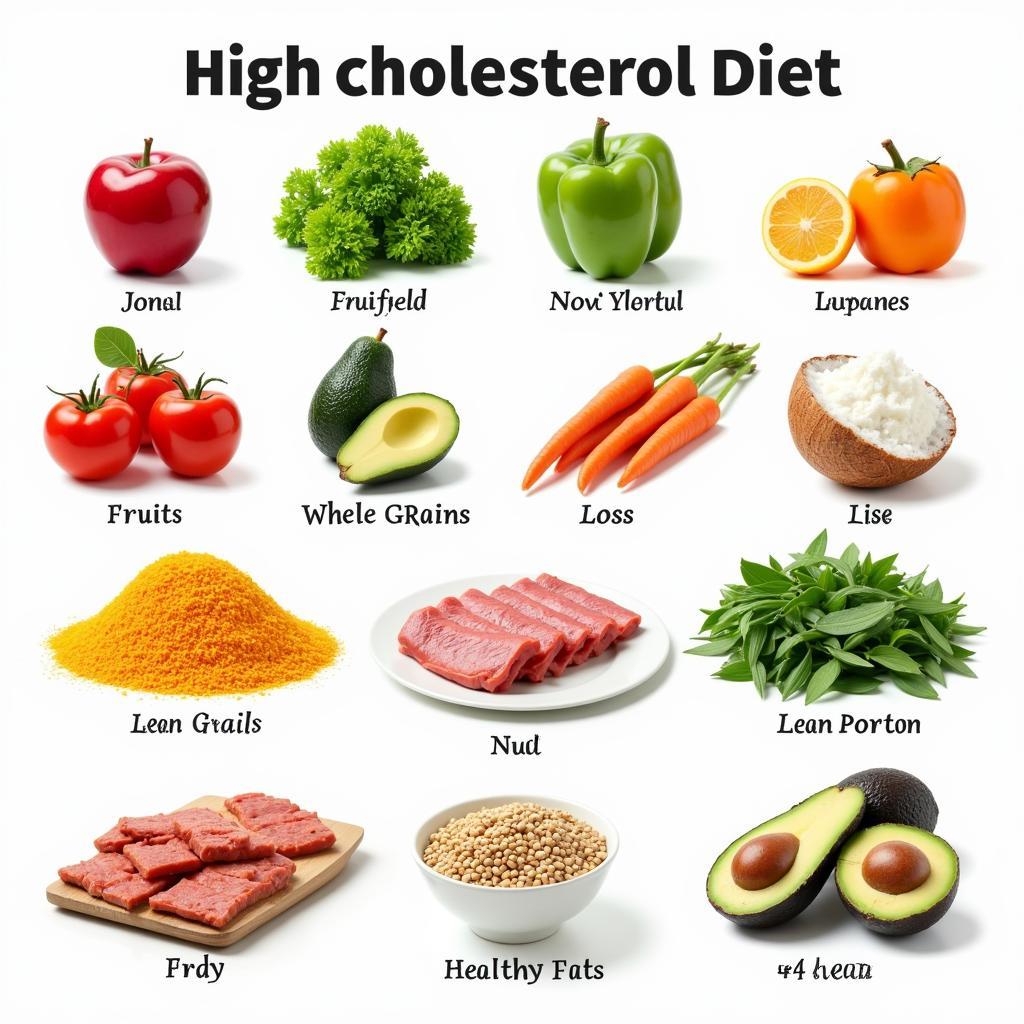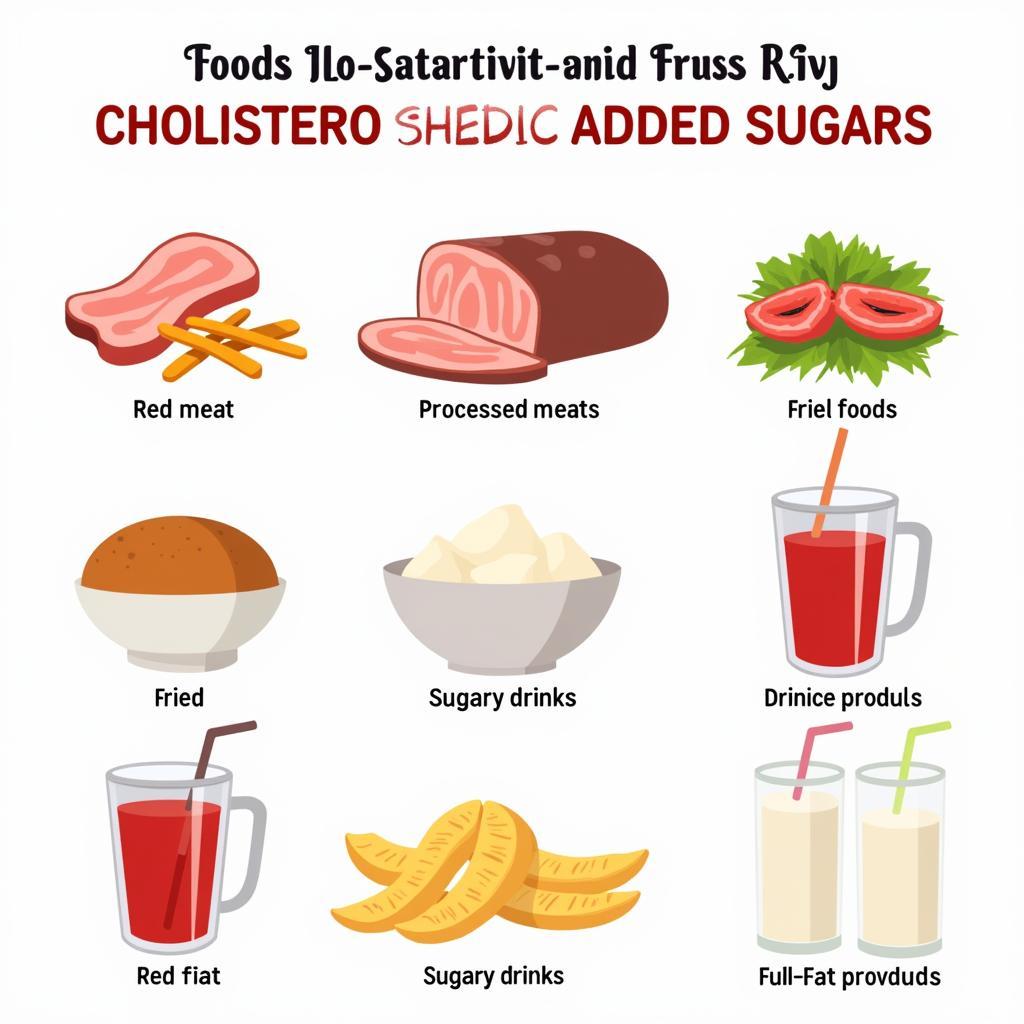High cholesterol is a common health concern that can significantly increase the risk of heart disease. Managing cholesterol levels through diet plays a crucial role in maintaining good heart health. This article will guide you through the essential do’s and don’ts of a cholesterol-lowering diet, providing practical tips and insights for incorporating healthy eating habits into your daily life.
Understanding Cholesterol and Its Impact
Cholesterol is a waxy substance found in your blood. While your body needs some cholesterol to function properly, high levels of LDL cholesterol (“bad” cholesterol) can contribute to plaque buildup in your arteries, increasing the risk of heart attack and stroke. Managing high cholesterol involves lifestyle modifications, including dietary changes and regular exercise.
 Foods for a High Cholesterol Diet
Foods for a High Cholesterol Diet
What to Eat for High Cholesterol
A heart-healthy diet emphasizes nutrient-rich foods that help lower LDL cholesterol and raise HDL cholesterol (“good” cholesterol). Here’s a breakdown of what to include in your diet:
- Fiber-rich foods: Soluble fiber, found in oats, barley, beans, lentils, apples, and citrus fruits, binds to cholesterol in the digestive tract and helps eliminate it from the body. Aim for 25-30 grams of fiber daily.
- Foods rich in omega-3 fatty acids: These healthy fats, found in fatty fish like salmon, tuna, and mackerel, as well as flaxseeds and walnuts, can help lower triglycerides and raise HDL cholesterol.
- Fruits and vegetables: Packed with antioxidants and fiber, fruits and vegetables contribute to overall heart health. Aim for at least five servings a day.
- Lean protein: Choose lean protein sources such as skinless poultry, fish, beans, lentils, and tofu. Limit red meat consumption.
- Nuts and seeds: Almonds, walnuts, flaxseeds, and chia seeds are excellent sources of healthy fats, fiber, and plant sterols, which can block cholesterol absorption.
What to Avoid with High Cholesterol
Certain foods contribute to high cholesterol and should be limited or avoided altogether:
- Saturated fats: Found in red meat, processed meats, full-fat dairy products, and some baked goods, saturated fats increase LDL cholesterol levels.
- Trans fats: Found in some processed foods and fried foods, trans fats are particularly harmful, raising LDL cholesterol and lowering HDL cholesterol. Check food labels for “partially hydrogenated oil.”
- Cholesterol-rich foods: Organ meats, egg yolks, and shellfish contain dietary cholesterol, which can contribute to high blood cholesterol in some individuals.
- Sugary foods and beverages: Excess sugar can contribute to weight gain and increased triglyceride levels, negatively impacting cholesterol levels.
 Foods to Avoid with High Cholesterol
Foods to Avoid with High Cholesterol
Managing High Cholesterol: A Holistic Approach
Dietary changes alone may not be enough to manage high cholesterol effectively. Consider these additional strategies:
- Regular Exercise: Aim for at least 30 minutes of moderate-intensity exercise most days of the week.
- Maintain a Healthy Weight: Losing even a small amount of weight can significantly improve cholesterol levels.
- Quit Smoking: Smoking damages blood vessels and lowers HDL cholesterol.
- Consult with your doctor: Your doctor can help you create a personalized plan to manage your cholesterol, which may include medication if necessary.
Conclusion
Following a heart-healthy diet is crucial for managing high cholesterol and reducing your risk of heart disease. By incorporating the right foods and avoiding those that contribute to high cholesterol, you can take proactive steps towards improving your overall health and well-being. Remember that making gradual, sustainable changes is more effective than drastic, short-term diets.
Frequently Asked Questions about High Cholesterol
- What is a healthy cholesterol level? A desirable level of total cholesterol is below 200 mg/dL.
- Can high cholesterol be reversed? Yes, lifestyle changes and medication can help lower high cholesterol.
- Are all fats bad for cholesterol? No, some fats, like omega-3 fatty acids, are beneficial for heart health.
- How often should I get my cholesterol checked? Your doctor will recommend how often to have your cholesterol checked based on your risk factors.
- What are the symptoms of high cholesterol? High cholesterol typically has no symptoms. Regular cholesterol checks are essential.
- Can I eat eggs if I have high cholesterol? While egg yolks contain cholesterol, they also contain nutrients. Talk to your doctor about how many eggs you can safely include in your diet.
- Are there natural remedies for high cholesterol? Some natural remedies may help lower cholesterol, but it’s essential to discuss them with your doctor.
For further information on healthy eating options, explore what to eat at ăn gì ở lê văn sỹ.
Need transportation for your medical appointments or other travel needs? Contact TravelCar for reliable car rental services. We offer a range of vehicles, including 16-seater, 29-seater, and 45-seater buses, perfect for group travel. We also provide airport transfers and custom tours.
Contact us for support: Phone: 0372960696, Email: TRAVELCAR[email protected], or visit our office at 260 Cau Giay, Hanoi. We have a 24/7 customer service team.
